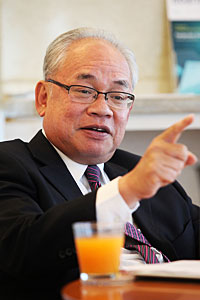
Last year was the 20th anniversary of the Asian Financial Crisis, a crisis which touched off a journey towards better governance throughout Asia. Thailand is no exception. Since then, continuous efforts have been made by the country's regulators, companies, and market participants alike to improve the policies and practices of corporate governance of Thai companies.
So far the efforts have yielded positive results, as is evident in the improving corporate governance (CG) scores of Thai listed companies in the Corporate Governance Report done annually by the Thai Institute of Directors Association (IOD) since 2001.
The said score rose to 80 (out of 100) last year from 50 in 2001. A similar exercise under the Asean CG scorecard Project in 2015 also ranked Thai listed companies first amongst the six Asean countries that participated.
Despite much achievement, the country's governance remains challenging. News of corporate governance scandals and poor practices continue to hit the headlines while bribery and corruption remain a serious threat to businesses. Such disconnect is disconcerting and begs a question whether the country's governance culture has really improved.
I want to share with you my thoughts on the subject in the form of two questions that I have often been asked as president and CEO of the Thai IOD.
First, what have been the dynamics behind the CG improvements in Thailand and whether they are real and lasting? Second, have these improvements led to any changes in the country's CG culture?
On the first question, it should be noted that the past five years have been a period of unprecedented fundamental corporate government change in Thailand. The focus of governance has shifted from shareholders to stakeholders, from CG action of companies that has begun to shift from box ticking to firm actions being taken, and from a passive CG environment and stakeholders of yesterday to a much more active CG ecosystem today. All this has come from the interactions of the dynamics coming from the regulators, companies, and other stakeholders combined.
I think these changes are real and faithfully reflect the desire of the people for things to improve. Therefore, with adequate participation and support, it can develop into a positive and long lasting force.
On the second question, many current developments point to an encouraging trend that the CG culture is improving, be it in terms of attitude, awareness, and willingness to take action. At the Thai IOD, we see a strong surge of interest of directors in taking courses on governance.
A recent count shows close to 3,000 directors a year attend our classes. It is noteworthy that more and more of these directors are coming from the non-listed companies and that they are relatively younger compared to those who attended the classes 10-15 years ago, pointing to an important transition that is taking place in Thai businesses.
It reflects an emergence of a new generation of leadership and directors with greater awareness and acceptance of corporate governance, as well as the willingness to embrace it. But have these developments made a visible impact on Thailand's CG culture and behaviour?
My answer is yes. Available data indicate that the structures of the boards of directors of Thai listed companies are now much stronger than ever before in terms of corporate governance best practices.
Specifically, 88% of Thailand's 620 listed companies now separate the chairman and CEO roles. Thirty-nine percent have an independent director as chairperson of the company's board of directors, 13% have independent directors comprising more than 50% of the boards, 51% have at least one female independent director on the board. Furthermore, the ratio of women on board in Thailand is currently 19%.
This happens even in the absence any formal rule, official guideline, or other forms of formal pressure.
The rapid expansion of Collective Action Coalition of the Private Sector against Corruption (CAC) also indicates that CG culture is practically spreading in Thailand, especially in the current environment where corruption is still rife.
The CAC is a voluntary platform where the signatory companies will be certified after having put in place the required policy and control mechanism against bribery and corruption.
Since its inception in 2010, 894 companies have joined of which 314 companies have been certified.
Last month the Thai IOD did a small opinion survey of our members, asking the same question whether they see CG culture in Thailand changing. The results show that 78% see the CG culture as having improved in the last five years, 15% see no improvements and 7% see the CG culture as deteriorating.
Most directors see the improvements in the CG culture to have come from the increased awareness of corporate governance by company board of directors and stakeholders who are willing to take action on it, supported by law and regulations and stronger enforcement. Going forward, they see strong enforcement and ethics of the board of directors to be key contributors to further improvements in the country's CG culture.
To further drive the CG improvement forward, the country needs to do more on improving corporate governance practices of companies, spreading corporate governance practices to other parts of the private sector including small businesses and non-profit organisations.
Last but not least, more efforts must be made to improve the quality of the public sector governance so that it can support the improvements in governance for the whole country.
Without which, it will be very difficult for Thailand to move much further on the journey on governance.
Bandid Nijathaworn is president and CEO of the Thai Institute of Directors Association.
